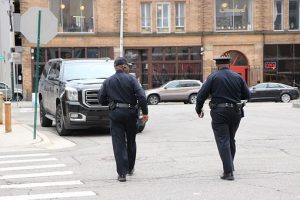New Jersey Employment Law Decision Examines Ramifications of Settlement of Police Officer Disciplinary Charges
Police officer discipline has significant ramifications under New Jersey employment law, whether the officer is in a civil service or non-civil service police department. These extend beyond the ramifications of discipline for other public and private employees in New Jersey. The Appellate Division of the New Jersey Superior Court recently examined some of these ramifications in its opinion in the case of Gilbert vs. Warren County Prosecutor.
Appellate Division of the New Jersey Superior Court recently examined some of these ramifications in its opinion in the case of Gilbert vs. Warren County Prosecutor.
Background
Jefferey C. Gilbert was a police officer with the Mansfield Township Police Department, a non-civil service jurisdiction. He settled department disciplinary charges arising from alleged misconduct during a DUI investigation. Gilbert accepted a six day suspension without pay to resolve all the disciplinary action against him, with the provision that the record of the discipline would remain in his personnel file and could be used as evidence if he received future disciplinary charges for the purposes of progressive discipline.
The Warren County Prosecutor then sent the Mansfield Police Chief a ‘Brady/Giglio’ letter. (The United States Supreme Court cases of Brady v. Maryland and Giglio v. United States generally require that the State turn over all exculpatory evidence to the defense in criminal prosecutions.) The letter provided that Gilbert:
‘will be permitted to participate in’ criminal investigations for the Mansfield Township Police Department only under certain conditions, including that: (1) he ‘may not articipate in any accident or DWI investigations’; (2) he ‘may not be the primary investigator on a case’; (3) any interview he conducts must be witnessed by another officer; (4) he may not collect evidence; (5) he must have a co-affiant on any search or arrest warrant; (6) if he is to be a witness in a prosecution, he must advise the prosecuting attorney of his disciplinary record prior to testifying; and (7) he ‘may not participate in any other countywide taskforce without the approval of the Prosecutor.
Gilbert filed suit in the Law Division of the Superior Court of New Jersey against the Prosecutor, the Police Department and his Police Chief. Gilbert argued that these restrictions violated his due process rights under the New Jersey Civil Rights Act and the New Jersey Constitution. He alleged, probably correctly, that the restrictions on his duties would hinder his career. He argued that this imposed after-the-fact discipline which would be improper because the settlement said that the only discipline would be the six day suspension. Moreover, because this was beyond what was imposed through the disciplinary process, he was entitled to a hearing under the statutes that govern the disciplinary process for police officers in non-civil service jurisdictions.
The Defendants filed a motion to dismiss the lawsuit in lieu of filing an answer to the complaint. They argued his suit should be dismissed because the restrictions were not discipline; he had the opportunity to contest the charges through the disciplinary process; and the restrictions were a legitimate and accepted means for the prosecutor to ensure that the State was meeting its Brady/Giglio requirements without compromising investigations. The Law Division judge agreed and dismissed Officer Gilbert’s lawsuit.
Gilbert appealed to the Appellate Division of the Superior Court of New Jersey.
The Appellate Division’s Opinion
The Appellate Division rejected all of Officer Gilbert’s arguments. The main thrust of the opinion was that the Brady/Giglio letter wasn’t discipline. Rather, the Appellate Division explained that:
We wholeheartedly agree with the trial court that the letter’s limitations on plaintiff’s investigatory functions are reasonably designed to protect the State from an undue litigation disadvantage by reducing the situations when plaintiff needs to be used as a witness in a criminal proceeding.” Since the letter was not disciplinary in nature, the statute governing disciplinary hearings for non-civil service officers was not implicated.
There is a strong likelihood that if the State had to call plaintiff as a witness, his prior disciplinary record would need to be disclosed in full or in part to opposing defense counsel as exculpatory material under Brady. The defense, in turn, would be able to use that information to impeach plaintiff’s credibility as a witness. The Prosecutor’s letter sensibly attempts to minimize the situations in which the State might need to rely on plaintiff as a witness, while still honoring its constitutional obligations to the defense under Brady.
The Takeaway
Officers facing disciplinary charges of a sort which might result in Brady/Giglio ramifications must be aware that settlement of disciplinary charges will not preclude restrictions being placed on their duties. And this might effect their chances for advancement. This principle applies in both non-civil service and civil service jurisdictions (although the statute at issue in this case applied only to non-civil service officers). These consequences should be considered and, if necessary, addressed before a settlement, not after. If they aren’t, it’s too late to go back and address them.
Contact Us
Our New Jersey employment attorneys represent government employees, including police officers, firefighters, EMS and all other civil service and non-civil service public servants in all aspects of New Jersey employment law. Call us at (973) 890-0004 or fill out the contact form on this page. We can help.
 New Jersey Lawyers Blog
New Jersey Lawyers Blog

